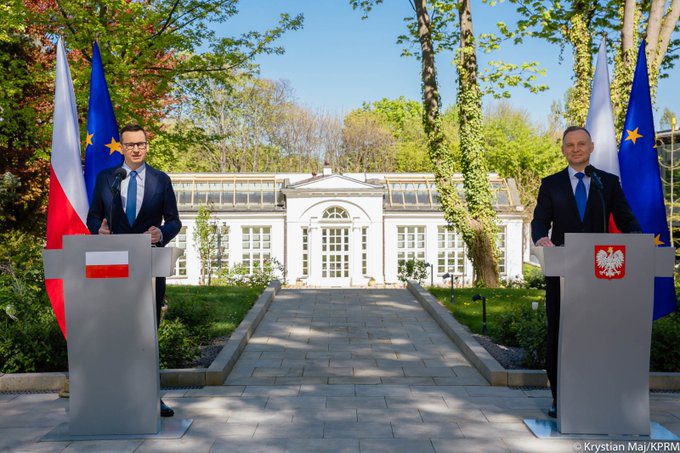
Polish PM Mateusz Morawiecki (left) and President Andrzej Duda (right).
Although Warsaw’s moment to assume the rotating presidency of the EU Council is still a bit further down the road in 2025, Poland already announced the foremost item on the agenda for when it happens: strengthening the European Union’s ties with the United States and getting Ukraine’s EU membership underway.
“One of our top priorities for the European Union during our presidency will be reinforcing our collaboration with the United States, strengthening the transatlantic ties,” said President Andrzej Duda on Monday, May 1st. The announcement was made during a joint press conference with Prime Minister Mateusz Morawiecki at the presidential palace in Warsaw, celebrating Poland’s 19th anniversary of joining the EU.
Prezydent @AndrzejDuda o priorytetach na prezydencję 🇵🇱 w 🇪🇺:
— Kancelaria Prezydenta (@prezydentpl) May 1, 2023
✅ Zacieśnianie więzi euroatlantyckich. Współpraca z USA ma znaczenie fundamentalne.
✅ Członkostwo Ukrainy i Mołdawii w UE.
✅ Odbudowa Ukrainy.
✅ Transformacja energetyczna. pic.twitter.com/qlrcZd1dNM
After talking about the experience his country has gained since joining the bloc in 2004, President Duda turned toward the future, and to the Council’s Polish presidency in the first half of 2025. Duda identified the primary objective of those six months as developing the cooperation between Brussels and Washington, first and foremost in security and economy.
“More United States in Europe, more Europe in the U.S.,” the president summarized his vision.
Listing previous successes of the transatlantic relationship, Duda highlighted the EU and the U.S.’ joint effort to support Ukraine, including the large presence of American troops in Poland and the overall strengthening of NATO’s eastern flank.
However, Duda expressed support for building an even more coordinated joint security system in the future, something he sees as the necessary next step for guaranteeing the security of European NATO members.
President Duda also discussed the prospects of further EU enlargement as an objective that Poland will work toward as Council president in 2025, calling the EU memberships of Ukraine and Moldova “a historical requirement.”
“We will do everything to ensure Ukraine joins the EU as soon as possible,” Duda proclaimed during the speech.
He also stressed that the EU candidates in the West Balkans (such as Serbia, Montenegro, Bosnia, Albania, and North Macedonia) should also be let in since they’ve been waiting for over a decade for their eventual admission.
“[We] know what it means to wait long, to desire to become a part of the free West, the part of which in a political sense we are today,” President Duda said.
Duda’s other key strategic goals for 2025 include the reconstruction of Ukraine as well as further diversification of the EU’s energy mix.
In his speech, Prime Minister Morawiecki also spoke out against the idea of European strategic autonomy which, in his opinion, would only “marginalize Europe” at this “geopolitical crossroad.” Furthermore, he underlined the importance of preserving the sovereign nation-states of Europe, calling sovereignty a fundamental guiding idea that is also the secret to Europe’s strength. “The role of nation-states is invaluable,” the PM added.
PM @MorawieckiM: We would like to play as big a role as possible within a strong, integrated #EU. The sovereignty of states is a fundamental idea that guides us.
— Chancellery of the Prime Minister of Poland (@PremierRP_en) May 1, 2023
Long live Europe as a community of sovereign states of the free world, long live Poland!
🇵🇱🤝🇪🇺 pic.twitter.com/M9UYelRwLk
During its nearly two decades of membership, Poland has held the Council presidency only once in 2011, during which it focused on completing the accession talks with Croatia and the association of agreement with Ukraine.
The EU Council presidency is given to all member states equally for six months at a time, with their turn coming every 13.5 years (until further enlargement). Each presidency has a program that identifies several primary goals.
The current Swedish presidency took the lead on January 1st while focusing on security, competitiveness, green energy transition, and democratic values. But before it’s Poland’s turn to do so, the presidency is first given to Spain (from July 1st), then Belgium and Hungary for their respective six months in 2024.
